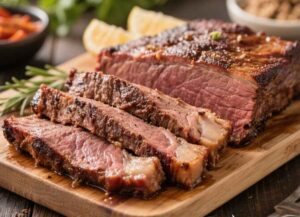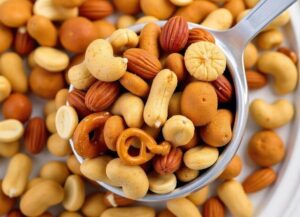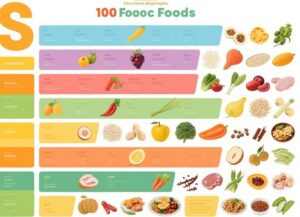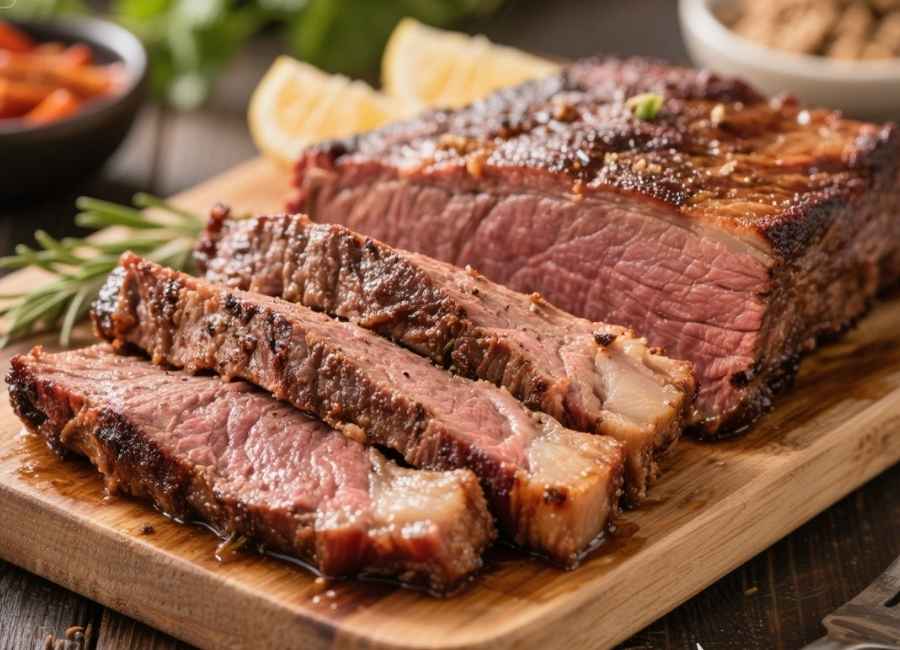Beef brisket sits at the center of many heated nutrition debates. Some call it an unhealthy indulgence, while others praise its protein content and essential nutrients. The truth lies somewhere in between.
This comprehensive guide examines the nutritional profile of beef brisket, its health benefits, potential drawbacks, and how to enjoy it as part of a balanced diet. You’ll discover exactly what this popular cut offers your body and learn practical tips for making healthier brisket choices.
What Is Beef Brisket?
Beef brisket comes from the breast section of cattle, located beneath the first five ribs. This cut contains two main muscles: the pectoralis major and the latissimus dorsi. The flat section is leaner, while the point contains more marbling and fat.
Butchers typically sell brisket as a large, rectangular cut weighing 10-16 pounds before trimming. The meat requires slow cooking methods like smoking or braising to break down tough connective tissues and create tender, flavorful results.
Nutritional Profile of Beef Brisket
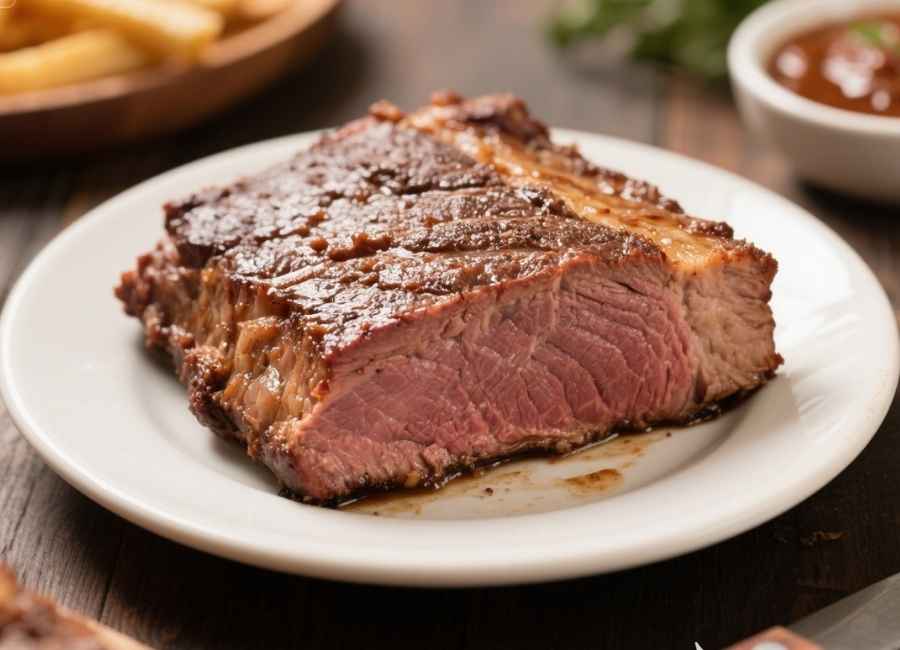
A 3-ounce serving of cooked beef brisket provides approximately:
Calories and Macronutrients:
- Calories: 210-280 (varies by fat content)
- Protein: 22-26 grams
- Fat: 12-20 grams
- Carbohydrates: 0 grams
Essential Vitamins:
- Vitamin B12: 70% of the daily value
- Niacin (B3): 25% of the daily value
- Vitamin B6: 15% of the daily value
- Riboflavin (B2): 10% of the daily value
Important Minerals:
- Zinc: 35% of the daily value
- Selenium: 30% of the daily value
- Iron: 15% of the daily value
- Phosphorus: 20% of the daily value
The exact nutritional content varies based on the specific cut, trimming, and cooking method used.
Health Benefits of Beef Brisket
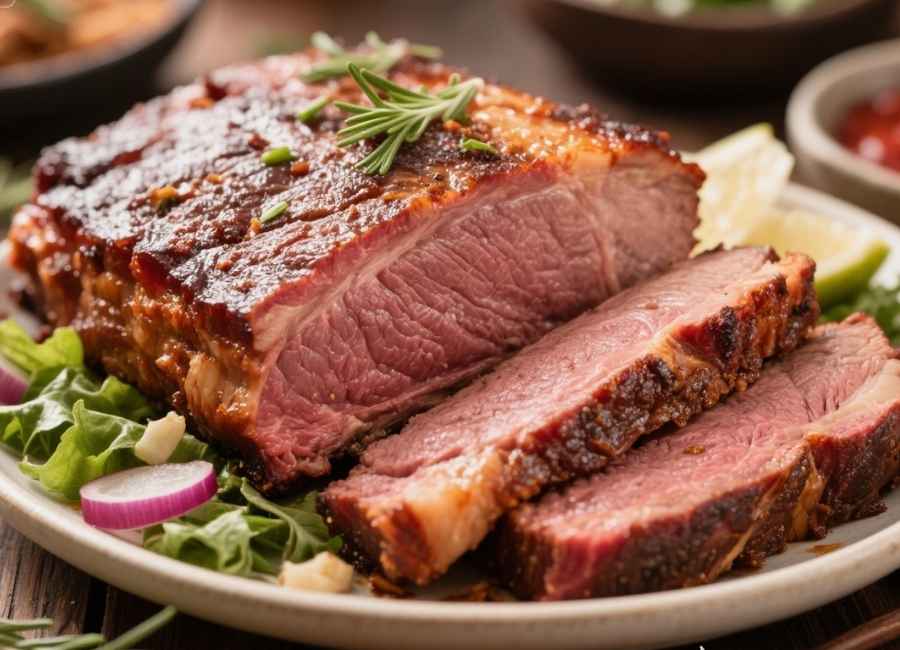
High-Quality Protein Source
Beef brisket delivers complete protein containing all nine essential amino acids your body cannot produce on its own. This protein supports muscle growth, tissue repair, and immune system function.
The biological value of beef protein ranks among the highest of all food sources. Your body can efficiently use nearly all the protein from brisket for essential functions.
Rich in B Vitamins
Brisket provides exceptional amounts of B vitamins, particularly B12. These nutrients support:
- Energy metabolism
- Nervous system function
- Red blood cell formation
- DNA synthesis
Vitamin B12 deficiency can cause fatigue, weakness, and neurological problems. Just one serving of brisket provides most of your daily B12 needs.
Essential Mineral Content
The zinc in beef brisket supports immune function, wound healing, and protein synthesis. Selenium acts as a powerful antioxidant, protecting cells from oxidative damage.
Iron from brisket comes in heme form, which your body absorbs more efficiently than iron from plant sources. This helps prevent iron deficiency anemia.
Supports Muscle Mass
The high protein content makes brisket valuable for maintaining and building muscle mass. This becomes especially important as you age and naturally lose muscle tissue.
Regular protein intake from sources like brisket can help preserve strength and mobility throughout life.
Potential Health Concerns
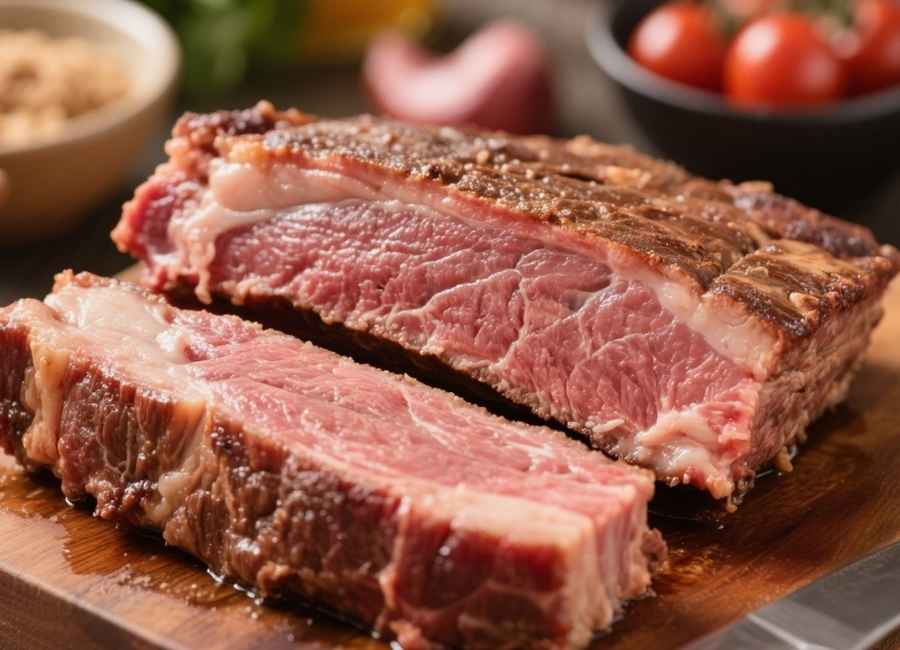
High Saturated Fat Content
Beef brisket contains significant amounts of saturated fat, especially in fattier cuts. Excessive saturated fat intake may contribute to:
- Elevated cholesterol levels
- Increased heart disease risk
- Higher inflammation markers
The American Heart Association recommends limiting saturated fat to less than 6% of total daily calories.
Calorie Density
Brisket packs substantial calories into relatively small portions. The fat content makes it easy to overconsume calories, potentially leading to weight gain if not balanced with physical activity.
Processing Concerns
Many commercial brisket preparations involve heavy smoking, curing, or processing. These methods can introduce:
- Nitrates and nitrites
- Polycyclic aromatic hydrocarbons (PAHs)
- Advanced glycation end products (AGEs)
Some studies link these compounds to increased cancer risk, though research remains ongoing.
Sodium Content
Restaurant and pre-seasoned brisket often contains high sodium levels from rubs, marinades, and sauces. Excessive sodium intake contributes to high blood pressure and cardiovascular problems.
How to Make Brisket Healthier
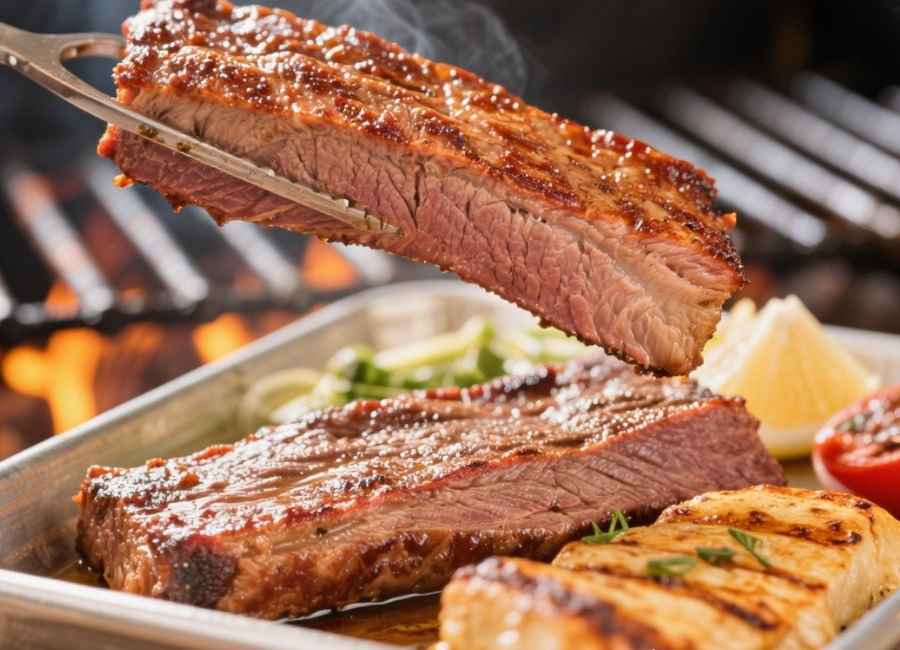
Choose Leaner Cuts
Select the flat portion of the brisket when possible. This section contains less marbling and overall fat content while maintaining protein levels.
Ask your butcher to trim visible fat before purchase, or trim it yourself at Home.
Control Portion Sizes
Stick to 3-4 ounce servings of cooked brisket. This provides substantial protein and nutrients without excessive calories or saturated fat.
Use a food scale initially to learn appropriate portion sizes, then estimate portions using visual cues.
Improve Cooking Methods
Healthier cooking approaches include:
- Slow roasting at low temperatures
- Braising in low-sodium broth
- Using dry rubs instead of sugary sauces
- Removing rendered fat during cooking
Avoid charring or burning the meat, which can create potentially harmful compounds.
Balance Your Plate
Pair brisket with nutrient-dense vegetables and whole grains. This combination provides fiber, vitamins, and minerals while diluting the calorie density of the meal.
Consider making brisket an accent to vegetable-heavy dishes rather than the main focus.
Limit Frequency
Treat brisket as an occasional protein choice rather than a daily staple. The American Institute for Cancer Research suggests limiting red meat to 18 ounces per week total.
Comparing Brisket to Other Proteins
Brisket vs. Chicken Breast (3 oz cooked):
- Brisket: 210-280 calories, 12-20g fat
- Chicken breast: 140 calories, 3g fat
- Both provide similar protein amounts
Brisket vs. Salmon (3 oz cooked):
- Brisket: Higher in iron and zinc
- Salmon: Contains omega-3 fatty acids
- Similar calorie and protein content
Brisket vs. Pork Tenderloin (3 oz cooked):
- Brisket: Higher in B vitamins
- Pork: Lower in saturated fat
- Both offer complete protein profiles
Who Should Limit Brisket Consumption?
Certain individuals may need to restrict brisket intake:
Heart Disease Patients: High saturated fat content may worsen cardiovascular conditions.
Weight Management Goals: The calorie density can interfere with weight loss efforts.
Kidney Disease: Protein restrictions may apply depending on disease severity.
Gout Sufferers: Red meat can trigger gout flares in susceptible individuals.
Always consult healthcare providers about dietary restrictions related to medical conditions.
Making Smart Brisket Choices
When shopping for brisket, look for:
- USDA Select grade for lower fat content
- Grass-fed options, when available
- Minimal processing and additives
- Proper refrigeration and handling
When dining out:
- Ask about cooking methods and ingredients
- Request sauces and seasonings on the side
- Choose smaller portion sizes
- Balance with vegetables and salads
The Bottom Line on Brisket Nutrition
Beef brisket offers valuable protein, B vitamins, and essential minerals that support overall health. However, its high saturated fat and calorie content require mindful consumption.
The key lies in moderation, preparation methods, and overall dietary balance. When enjoyed occasionally as part of a varied diet rich in vegetables, fruits, and whole grains, brisket can fit into healthy eating patterns.
Focus on lean cuts, appropriate portions, and healthier cooking methods to maximize benefits while minimizing potential drawbacks. Remember that no single food determines your health status—your overall eating pattern matters most.
